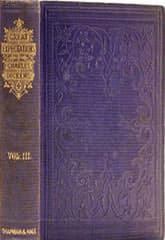Great Expectations
Critique • Other views • Quotes • Text • At the movies
 First edition
First editionFirst publication
1860–1861, serial in All the Year Round periodical
First book publication
1861 in three volumes
Literature form
Novel
Genres
Literary, Gothic romance
Writing language
English
Author's country
England
Length
Approx. 189,000 words
Expectations dashed—and surpassed
The greatest expectation to be quashed in Great Expectations may be our assumption that the innocent lad at the centre of the story will turn out to be another David Copperfield or Oliver Twist.
You know, overcoming an adverse childhood and the persecution of evildoers. Maintaining an innocent and rigid integrity. Eventually triumphing. All that.
G.K. Chesterton wrote in a preface to an edition of this novel:
All [Dickens's] books might be called "Great Expectations". But the only book to which he gave the name "Great Expectations" was the book in which the expectation was not met.
This is indeed a unique Dickens novel. Fantastic and realistic by turns, with the realistic part showing how the "hero", young Pip, has his head turned by wealth. While other Dickens protagonists stay fiercely loyal to their family and oldest friends, Pip thinks to rise above his.
The most interesting thing about this is how he brings the reader along with him. Most of us probably guess, long before he does, that there is a problem with the origins of Pip's wealth. We even get a little squeamish about the compromises he makes and his condescension toward his lower-class loved ones.
But nonetheless we continue to consider the delightful Pip—as no doubt we consider each of ourselves—to be a basically decent person. We invest in him as he makes his way up in the world.
So when Pip's illusions are finally shattered, we too feel shame for how he has behaved. What we had experienced as slight moral quibbles along the way are now felt with their full force as symptomatic of a life that is a complete sham.
Cinematic scenes
It is remarkable that such a clear-eyed view of human nature should be a book that also features some of the most grotesquely memorable scenes Dickens ever wrote:
• The young boy's fateful care for the escaped convict Magwitch at the beginning (as you can see in the sample text of the first chapter).
• His introduction to the bizarre, old Miss Havisham, who in her rundown estate still wears the rags of the wedding dress she'd worn the day she was abandoned at the altar, and to her beautiful but cruel ward, Estella, who bewitches him.
• The climactic desperate chase on the river.
With such scenes, this novel—along with Oliver Twist and A Christmas Carol—is unsurprisingly among Dickens's most popular works for film adaptation.
Dickens is often faulted for having melodramatic narratives that conclude weakly, but his late novels (at least from A Tale of Two Cities on) are his most carefully plotted. Great Expectations is controlled and intriguing throughout. Finally the loose ends are tied up satisfyingly without the usual feeling one gets with Dickens that he's had to strain credibility, as well as several laws of physics and psychology, to make it all fit together.
The conclusion of the doomed Pip-Estella relationship is often critiqued as unrealistically salvaging a bittersweet resolution. Dickens just can't win with some readers.
But for me it is his most realistic ending, neither romanticized nor cruel.
Most importantly, intellect aside, it just feels right. The way it is. With hope for the future but, at last, an honest hope.
One's expectations of a typical Dickens novel may be disappointed, but one ends up being greatly rewarded in other ways by Great Expectations, perhaps more than by any other Dickens novel.
— Eric
Critique • Other views • Quotes • Text • At the movies

